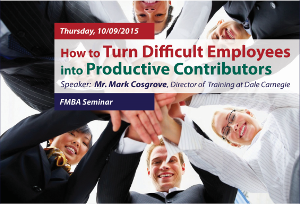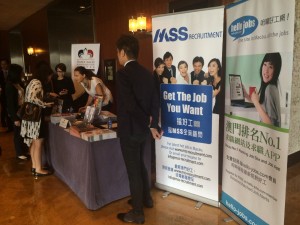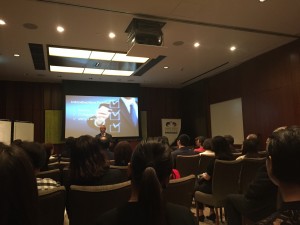News Category 
Hot Tags 
News Detail 
HR Seminar by FMBA, MSS Recruitment and hello-jobs.com
- 2015-09-15

HR Seminar organized by France Macau Business Association and co-organized by MSS Recruitment and hello-jobs.com held successfully on 10th September, 2015 in Mandarin Oriental Macau. Mark Cosgrove, Director of Training at Dale Carnegie Hong Kong conducted a seminar on “How to turn challenging employees into productive contributors” attended by dozens of managers and HR professionals in Macau.
Source From: Macau Daily Times
The implementation of employee training and development programs is particularly crucial for the local job market as the city’s unemployment rate remains low, according to Mark Cosgrove, Director of Training at Dale Carnegie Hong Kong.
Mr Cosgrove conducted a seminar yesterday on “How to turn challenging employees into productive contributors” in an event organized by the France Macau Business Association (FMBA), attended by dozens of hotel managers and employees in other local industries.
“Training is critical here in particular because of the numbers you’re dealing with. You still have almost full employment, and that means you’re competing for frontline staff,” he told the Times on the sidelines of the seminar.
He suggested managers in Macau companies “train employees, and grow them inside the organization. That’s how you keep people. One major way to do that is through training and development.”
Mr Cosgrove recalled that in specifically large organizations, CEOs rely on their line managers to ensure employee engagement. But companies need to guarantee that supervisors and line managers get the support and tools needed to manage people.
“Do they have the tools and understand how to motivate and inspire people? You can be the world’s best baccarat dealer, but do you know how to manage dealers?” he questioned.
The training expert acknowledged that Macau’s economic downturn puts added pressure on both managers and employees. There is added pressure to find alternative revenues and explore different ways of doing business too, he said.
Yesterday’s seminar urged participants to reflect upon what makes employees become difficult and disengaged with the organization they work for. Mr Cosgrove then discussed with his audience how to increase understanding and improve relationships between employees and employers.
Some participants argued that employees’ salaries can drive them to engage or disengage with the company, but money alone is not what contributes most to employee disengagement. Career goals, corporate culture, the organization’s mission, and employees’ passion for their work also affect commitment levels.
Mr Cosgrove acknowledged that recognition and culture matter more than money to most employees, and suggested that managers care for their employees and treat them as valuable people with skills. He also recommended that employees start viewing employers as employers with difficulties, rather than difficult employers.
Mr Cosgrove assured that the fundamentals used to improve employer-employee relationships are similar in Asian and Western countries. “I think what we always have to look for is culturally appropriate ways to approach [employees]. So the fundamentals are the same, we must take an interest in our employees, we must make our employees feel valued and important,” he said.
The training expert suggested nine ways for participants to change their employees’ behavior, namely by praising the slightest improvements, giving the other person a fine reputation to live up to, using encouragement, helping them to feel that mistakes are easy to correct, or making the other person feel happy to do what you’ve suggested.
When problems with employees arise, Mr Cosgrove recommended that managers ask questions instead of making assumptions, while focusing on the problem and not the person. Giving employees clear directions and implementing accountability measures is also a key feature of good management.
Copyright @ Macau Daily Times



